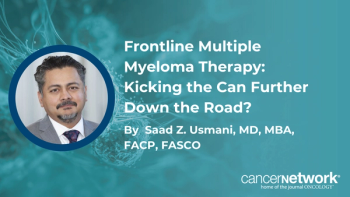
FDA Approves Abatacept as a Preventative Treatment for Acute Graft-Versus-Host Disease
Abatacept can now be used for the prevention of acute graft-versus-host disease following its approval by the FDA.
The FDA has approved the use of abatacept (Orencia) in combination with immunosuppressants as a prophylactic treatment for acute graft-versus-host disease (aGVHD) in adult and pediatric patients 2 years or older who are set to undergo hematopoietic stem cell transplant from an unrelated donor, according to a press release from the FDA.
The indication marks the first approval of a drug for the prevention of a GVHD based on real-world evidence. The agent was assessed as part of the phase 2 GVHD-1 study (NCT03459040) in patients with steroid-refractory aGVHD who received a transplant from a matched, unrelated donor.
Although treatment with abatacept did not significantly improve severe aGVHD survival (87%) vs placebo (75%), patients in the experimental arm experienced overall survival at a rate of 97% compared with 84% in the placebo arm. Additionally, treatment with abatacept resulted in a moderate/severe aGVHD-free survival of 50% vs 32% in the placebo arm.
“Acute graft versus host disease can affect different parts of the body and become a serious post-transplant complication,” Richard Pazdur, MD, director of the FDA’s Oncology Center of Excellence and acting director of the Office of Oncologic Diseases at the FDA’s Center for Drug Evaluation and Research, said in a press release. “By potentially preventing the disease, more patients may successfully undergo bone marrow or stem cell transplantation with fewer complications.”
The most common adverse effects included anemia, hypertension, cytomegalovirus (CMV) reactivation/CMV infection, fever, pneumonia, and nosebleed.
Reference
FDA approves first drug to prevent graft versus host disease. News release. FDA. December 15, 2021. Accessed December 15, 2021. https://bit.ly/3m6U3lP
Newsletter
Stay up to date on recent advances in the multidisciplinary approach to cancer.






































